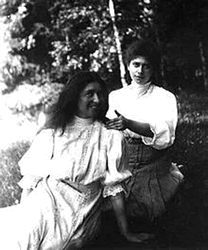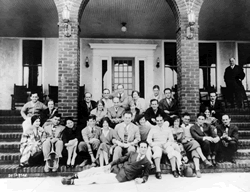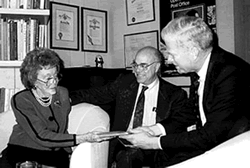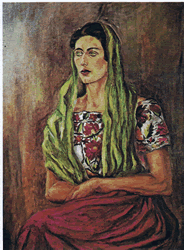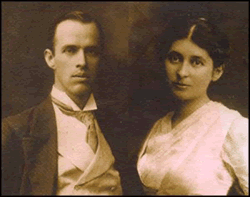#strnky-1:
Rose and her sister Anna Strunsky
#strnky-2:
The Strunsky family at the Atlantic Hotel in Belmar, NJ, 1926. Lee Gershwin is to the left of her husband Ira, on the right-hand side. Her father Albert Strunsky stand in a black coat, in the upper right.Strunsky family hotel in Belmar, NJ, 1926; in front: George Gershwin; first row: Marjorie Paley, Morris Strunsky, Elsie Payson, Howard Dietz, Cecilia Hayes, Arthur Caesar, Emily Paley, Phil Charig, Leonore Gershwin, Ira Gershwin, George Backer, Harold Goldman; second row: Cecilia Ager, Mrs. Bela Blau, Mischa Levitski, Henrietta Malkiel Poynter, Jim Englander, Anita Keen; third row: Milton Ager, Lou Paley, Bela Blau, S. N. Behrman, Mrs. Arthur Caesar, English Strunsky, Harold Keyserling, Barney Paley; rear right: Albert “Papa Strunsky.”
#strnky-3:
Dr. Billington of the Library of Congress accepts the donation of Leonore Gershwin (daughter of Albert Strunsky) of the earliest of George's manuscript tunebooks at Mrs. Gershwin's home in 1991 as they are joined by her nephew, Michael Strunsky.
#strnky-5:
?Emily Paley, painting by George Emily Paley,daughter of Albert Strunsky, painting by George Gershwin
#strnky-6:
Journalist and socialist William English Walling and his wife, Anna Strunsky
Rose Strunsky
http://spartacus-educational.com/Rose_Strunsky.htm
Sections
1905 Russian Revolution
Rose Strunsky in Russia
First World War
Primary Sources
References
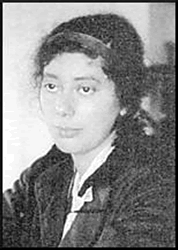
Rose Strunsky, the daughter of Elias Strunsky, a successful businessman, was born in Russiain 1884. Her mother, Anna Horowitz Strunsky, had married her husband when she was only sixteen-years-old. Rose's sister, Anna Strunsky later recalled: "The only recollection of Russia for me was of a long village street and barefoot children and rambling hovels. I remembered myself a little child standing in a patch of sunlight and poking my fingers into a wall and finding it soft as sand." (1)
Rose's mother was aware that she had two very bright daughters: "My two small daughters were pretty and intelligent and had good brains... When I used to go upstairs and look at them and think that they will have a college education and will have professions, one can imagine how I felt as a mother." (2)
In 1885 the Strunsky family emigrated to the United States: "The Strunskys came to America carrying little beyond the family feather-beds and copperware. Like other hundreds of thousands, they made their first home on New York's Lower East Side, crowded into a tenement on Madison Street with the toilet in the backyard." (3)
The Strunsky's lived in New York City before moving to San Francisco in 1894. During her last year in high school, Anna Strunsky joined the Socialist Labor Party (SLP). She later recalled: "You are born a socialist. You are born with music, or poetry or painting or science. You can't really become a socialist unless you're born that way." Her father, who had inspired her interest in politics, disagreed with her decision - "not because he grudged me to a great cause, but because he felt there was something amiss with the cause with which I had become infatuated." (4)
1905 Russian Revolution
After the 1905 Russian Revolution the Strunsky sisters established a branch of the Friends of Russian Freedom in San Francisco. Other members included Jack London, William English Walling, George Sterling, Cameron King and Austin Lewis. Anna became chairman and produced a leaflet calling for "sympathy and help" for the Russian people. Walling, who was just about to leave for Europe sent her a note: "I almost shouted with delight at the dash with which you have under taken your Russian movement. Your leaflet is the best yet." (5)
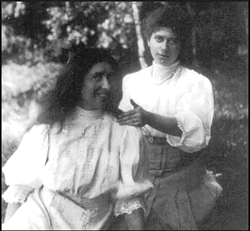
Anna and Rose Strunsky
In November 1905 William English Walling wrote to Anna Strunsky telling her that he intended going toSt. Petersburg to witness the impact of the 1905 Russian Revolution, he sent her a telegram inviting her to join him. "I intend to preach (in American publications) the necessity in Russia of: (i) The stirring of the masses to revolt - of the lower orders, to the utmost (ii) Widespread battle against Cossacks and police and execution of bureaucrats (iii) The most complete political revolution, perhaps a republic." (6)
Rose Strunsky in Russia
Anna and Rose took up the offer and arrived in December, 1905: "He (Walling) met us at the train, dressed in a big Russian coat and an astrakhan cap. I kissed him." Strunsky was excited by the revolutionary atmosphere of the city. "On the streets, they were selling pamphlets, the covers of which were decorated with the portraits of Karl Marx, Bakunin, Kropotkin. In the windows of book shops were displayed photographs of Sophi Perovski, who was executed for taking part in the assassination of Alexander II; of Vera Zassulich, the first to commit a deed of violence for political reasons in modern Russia; of Vera Figner, whose resurrection from the Fortress of Schlusselburg had just taken place... More astounding... were the cartoons which appeared several times a day were bought as quickly as they could be had - cartoons portraying the Czar swimming in a sea of blood, mice gnawing away the foundation of the throne... Was I dreaming? Free press, free speech, free assemblage in Russia." (7)
The sisters were shocked by the level of violence that they saw in Russia. They were in a restaurant along with William English Walling when they were singing "God save the Czar!". However, a young man sitting with his mother and girlfriend, refused to join in. An officer at a nearby table walked over to him and commanded him to rise. When he refused, he shot him dead. Anna Strunsky wrote to her brother, Hyman Strunsky about how the incident drew her closer to Walling: "On New Year's Eve we saw a student shot to death in a cafe for refusing to sing the national hymn, and our love which had been filling our hearts from the hour of our meeting suddenly burst into speech. It was baptised in blood you see, as was fitting for a love born in Russia." Anna also wrote to her father admitting her love for Walling: "I found Russia in the same hour that I found love. It was fated. Russia had stood for quite other things, but the man I love and who loves me, so tenderly, dear, as tenderly as mother, and as deeply has opened vistas before me and changed the face of things forever." (8)
On 26th January, 1906, Walling wrote to his parents about the woman he intended to marry: "She is considered by Mr. Brett the manager of Macmillans as nothing less than a genius in her work as a writer. She is the most known speaker on the Coast. She is loved, sometimes too much, by everybody that knows her - literary men, Settlement people, Socialists. All my friends know her. She is 26 and very healthy and strong... Of course she is a Jewess and her name is Anna Strunsky (but I hope to improve that - at least in private life - but we haven't spoken much of such things). (9)
Walling and Strunsky left Russia in May 1906. Rose Strunsky remained and continued to work with the revolutionaries. The couple arrived in Paris on 2nd June 1906, and married at the end of the month. The San Francisco Call newspaper carried the headline: "Girl Socialist Wins Millionaire". (10) Another newspaper, The Chicago American stated: "Socialism Finds Bride for a Rich Yankee in Russia" and compared their marriage to those of Graham Stokes and Rose Pastor and Leroy Scott and Miriam Finn, two rich men who married left-wing Jewish immigrants. (11)
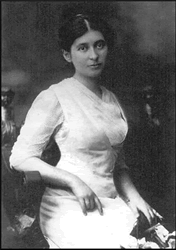
Anna Strunsky in 1906
In October 1907 Strunsky and Walling returned to Russia to join Rose. Soon after arriving in St. Petersburg they were all arrested. "When I opened the door of our apartment, I found a Chief of Police, gendarme spies, the proprietor of the hotel, and servants. The contents of our trunks lay scattered on floor, chairs and bed. The desks were littered with books and manuscripts. They were reading my letters, scrutinizing my photographs... When I entered the room and saw the confusion of clothes and papers, my checks flamed with anger and horror." Strunsky claimed they asked her: "Where do you hide your revolvers and dynamite." She told the interpreter. "Tell him that we are writers, and when we use weapons we use pen and ink and not arms." (12)
Other journalist friends such as Harold Williams and Ariadna Tyrkova, were also detained. All five were accused of writing articles supporting the revolutionaries. The American newspapers soon took up their case. The Boston Herald headed its story "Czar's Police Jail Harvard Men." (13) The The Chicago Americanreported that Elihu Root, the United States Secretary of State, had already protested about the behaviour of the authorities. (14) They were soon released but were deported.
First World War
Rose Strunsky joined the Women's Peace Party and argued for a negotiated peace. Other women involved in the organization included Anna Strunsky, Jane Addams, Mary McDowell, Florence Kelley, Alice Hamilton, Anna Howard Shaw, Belle La Follette, Fanny Garrison Villard, Emily Balch, Jeanette Rankin,Lillian Wald, Edith Abbott, Grace Abbott, Mary Heaton Vorse, Freda Kirchwey, Charlotte Perkins Gilman,Crystal Eastman, Carrie Chapman Catt and Sophonisba Breckinridge. Anna's husband, William English Walling described the activities of these women as "bourgeois pacifism". (15)
Rose Strunsky became involved with the journalist, Louis Levine. On 22nd June, 1920, she wrote to Anna Strunsky: All his desire seems to have petered out... As for my side of it - if I could have aroused any tenderness in him - the thing between us would have happened 7 years ago." (16) Soon afterwards Levine wrote to her and proposed marriage. The couple were married in September, 1920.
The couple moved to Wisconsin where he obtained a teaching job at Beloit College. However, the following year he accepted an offer from the Chicago Daily News to be a correspondent in the Soviet Union. After giving birth to a son, Boris, in October 1921, she travelled to Moscow, to be with her husband. Rose also wrote a couple of articles for McClure's Magazine. (17) Rose also translated books written by Maxim Gorky and Leon Trotsky.
Rose Strunsky Lorwin died in New York City in 1963.
Anna Strunsky and William English Walling.
By James Boylan.
Illustrated. 334 pp. Amherst:
University of Massachusetts Press. $34.95.
FEW people today can imagine, let alone recall, a time when Socialism
was widely considered a plausible ideology for governing the United
States. Yet before World War I, forging a society without disparities
of wealth and power tantalized millions of Americans. Untainted by
association with repression, Socialism was a cousin of progressive
liberalism -- debated rationally, taught in schools. Socialists were
taken seriously as political, even Presidential, candidates.
Socialism's promise appealed especially to what the historian John P.
Diggins calls the ''Lyrical Left.'' Reveling in Greenwich Village and
other bohemias, these journalists, poets and artists frequented
salons, contributed to literary magazines, agitated for female and
black equality, slept around and otherwise shattered Victorian norms.
Many -- Walter Lippmann, Lincoln Steffens, W. E. B. Du Bois, Max
Eastman, Edna St. Vincent Millay, to name a few -- helped transform
the culture.
In ''Revolutionary Lives,'' James Boylan, an emeritus professor of
history and journalism at the University of Massachusetts, competently
tells the story of Anna Strunsky and William English Walling, who
became partners in writing, politics and marriage. Strunsky, a Jewish
immigrant who once wrote an epistolary novel with Jack London, and
Walling, a genteel WASP who helped found the N.A.A.C.P., fell in love
during the Russian Revolution of 1905 and promptly caught the fancy of
society pages across America. Like the intellectuals' romance with
Socialism, theirs burned brightly for a spell, only to be extinguished
in the devastation of World War I.
Boylan knows that his subjects' lives don't cry out for
memorialization. They lack, he notes, ''the skein of achievement,
career or power from which historical reputations are made.'' Yet they
merit a joint biography, he proposes, because recent scholarship has
allowed historians to ''explore more freely now the links between
domestic and public spheres'' of notable figures. Occasionally he does
establish such links, as in his account of Strunsky and Walling's 1905
trip to Russia as up-and-coming journalists. Boylan portrays their
headlong romance as inextricably tied to their heady adventures
covering the strikes, pogroms and gunplay in the streets of St.
Petersburg. Generally, however, ''Revolutionary Lives'' does not use
the pair to reveal larger truths about the era's passionate young
leftist literati -- nor indeed to reveal much beyond the facts of
Strunsky and Walling's only moderately interesting lives.
After marrying, Strunsky and Walling pursued writing careers, he with
some success, she with almost none. Strunsky found herself sidelined
by a seemingly endless succession of pregnancies, as well as by
psychological blocks in completing her own books and articles. Walling
took up a series of progressive causes, notably the crusade for racial
equality, and wrote several books about Socialism that were
overshadowed by those of Herbert Croly and Walter Weyl.
Disagreements over World War I split the Socialist movement; Walling
loudly joined the minority, including Lippmann and Samuel Gompers,
that vigorously supported American intervention, a stance that
alienated him not only from old friends but from his wife. Hungry for
the favor of President Woodrow Wilson, Walling scorned dissenters and
seemed unmoved when, after the war, a Federal crackdown left Socialism
in tatters.
Boylan's account effectively ends after the war. Justifiably so, since
Walling and Strunsky faded from the scene afterward. Like many
ex-radicals, Walling drifted rightward until he died in 1936, at 59.
Strunsky held on till 1964, never finishing her biography of Jack
London. History made just modest note of them, a judgment that
''Revolutionary Lives'' seems unlikely to change. Still, their voices,
if minor, were part of the important chorus of the Lyrical Left.
David Greenberg-
----------------------------------------------------------
"Anna Strunsky was born in Babinotz, Russia, on March 21, 1878. With
her parents, radicals in old Russia, she came to San Francisco, where
she was educated. She was vitally interested in social problems,
literature, and the labor movement.
Anna and her family lived in the home of her brother, Dr. Max
Strunsky. She and her sister Rose were members of a radical group of
young Californian writers and artists that included Jack London, Jim
Whitaker, George Sterling, and others. The Strunsky sisters were
leaders of the intelligentsia that flourished in San Francisco at the
turn of the century.
Jack and Anna were regular participants in the activities of the Bay
Area socialists. They were very good friends, and at first did not
think of each other romantically. Theirs was an affair of two highly
intellectual minds with similar ideas and dreams. Anna Strunsky was a
powerful influence in the life of Jack London. Except for a short
period in 1902 when Jack fell in love with her, they were only very
close friends. Anna was never in love with Jack, but always had the
deepest respect for him.
By late 1900 their letters about the nature of love evolved into their
collaboration on The Kempton-Wace Letters. Jack, as Herbert Wace,
would discuss love from the biological point of view; and Anna, as
Dane Kempton, would take the idealistic and emotional viewpoint. The
Kempton-Wace Letters were published in 1903, and they constitute one
of the most interesting and curious books in the whole literature of
love."
Source: Kingman, Russ. A Pictorial Life of Jack London (Crown, 1979).
Among the most interesting people I met in San Francisco were two
girls, the Strunsky sisters. Anna, the elder, had attended my lecture
on Political Action. She had been indignant, I afterwards learned,
because of my "unfairness to the socialists." The next day she came to
visit me "for a little while," as she said. She remained all
afternoon, and then invited me to her home. There I met a group of
students among them Jack London, and the younger Strunsky girl, Rose,
who was ill. Anna and I became great friends. She had been suspended
from Leland Stanford University because she had received a male
visitor in her room instead of in the parlour. I told Anna of my life
in Vienna and of the men students with whom we used to drink tea,
smoke, and discuss all through the night. Anna thought that the
American woman would establish her right to liberty and privacy, once
she secured the vote. I did not agree with her. I argued that the
Russian woman had long ago established, even without the vote, her
social and moral independence. Out of it had developed a beautiful
camaraderie, which makes the relations of the sexes so fine and
wholesome among advanced Russians.....
From; Living My Life
by Emma Goldman
------------------------------------------------------------------------
Published: June 4, 2003
STRUNSKY, , W. ENGLISH
Print Save
STRUNSKY--W. English. Age 94. Died June 2, 2003 in San Francisco, CA.
Long-time resident of New York City and husband of Lucy Stampleman,
who passed away July 22, 2002. Brother-in-law of Ira Gershwin and
Co-Trustee of his musical estate. Father of Michael. Father-inlaw of
Jean Zimmerman and grandfather of Burke and Lara-Joelle. Memorials are
being planned. Contributions may be made to the San Francisco Jewish
Family and Childrens Services, 2150 Post St., San Francisco, CA 94115.
STRUNSKY--W. English. We mourn the loss of English Strunsky. At 94
years old, the end of an era. He will be greatly missed. Our
sympathies to Michael, Jean, Lara and Burke. Sheryl, Jim, Aaron, Eric
and Caroline Reuben
------------------
"McGinity reminds us too of Rose Pastor Stokes (1879-1933), and Anna
Strunsky (1877-1964), also immigrant Jewish women who intermarried in
the early 1900s. Stokes was a socialist and anti-war activist;
Strunsky, a writer. "They for the most part moved into their husbands'
and mainstream social circles," McGinity reports. "They left the
Jewish fold, more than not.""
1899 Jack London Meets Anna Strunsky, a brilliant and charming
Stanford University student of Russian Jewish descent. Their
challenging relationship, stimulated by differing opinions, led to
co-authorship
http://72.14.203.104/search?q=cache:fC8RpfQ1O7cJ:www.interfaithfamily.com/site/apps/nl/content2.asp%3Fc%3DekLSK5MLIrG%26b%3D297380%26ct%3D1466037+Strunsky+jewish&hl=en&gl=us&ct=clnk&cd=7
".....Gershwin heir Michael Strunsky, whose aunt married Ira, attended
the Carnegie Hall tribute as well as performances held all over the
world in George Gershwin's honor. Managing the Ira and Leonore S.
Gershwin Philanthropic Fund as its sole trustee has become a full-time
job for Strunsky, who was formerly in the construction business. He
has committed himself to the family legacy by promoting George's and
Ira's works with theater companies.
Though George died when Strunsky was but a toddler, he was raised on
Gershwin tales by Aunt Leonore and Uncle Ira. The enchanted nephew
recalled that the Gershwins were not particularly religious but both
Ira and George were raised with plenty of Yiddishkeit.
"Yiddish was spoken in the family," he said. "It was not the principal
language. Like so many immigrant families, they immediately changed
the primary language of the family to English."
Later, Ira and Leonore were known to give generously to Jewish causes.
The couple's philanthropic fund is supervised by the S.F.-based Jewish
Community Federation.
Perhaps no one was more fascinated by Gershwin history than Haran.
"He was such a dashing figure of the day kind of like the Beatles,"
she said, conceding a soft spot for male Jewish musicians (she later
married one)...."
STRUNSKY, SIMEON,. author, editor; b. Russia, 1879; r. New York City.
...
---------------------------------
-Lending pursued his political goals through journalism and public
speaking, meanwhile making his living in sales and advertising in New
York City. He married Jean Strunsky in 1949 and lived in Mexico City
between 1950 and 1952. In 1960 he married Florence Davis. Their only
child together died of Tay-Sachs Disease at age three.
-------------
Wilk, Gerard H.
"HATIKVAH" .........year 1897 found him in California, the frequent
guest of a family of literary distinction and of Russian Jewish
origin, Strunsky by name, whose young daughters were deeply impressed
by his wit and his consumption of whisky: at dinner, having emptied
his glass
.Simeon Strunsky
From Wikipedia, the free encyclopedia
Jump to: navigation, search
Simeon Strunsky, A.B. (July 23, 1879–February 5, 1948) was an American
essayist, born at Vitebsk, Russia. He graduated from Columbia
University in 1900. He was a department editor of the New
International Encyclopedia from 1900 to 1906, editorial writer on the
New York Evening Post from 1906 to 1913, and subsequently was literary
editor of that paper until 1920. His columns also appeared in Atlantic
Monthly, Bookman, Collier's, and Harper's Weekly. He wrote:
Through the Outlooking Glass with Theodore Roosevelt (1912)
The Patient Observer (1911)
Belshazzar Court, or Village Life in New York City (1914)
Post-Impressions (1914)
He joined the New York Times in 1924 and was on staff until his death
in Princeton, New Jersey, where he was hospitalized for three months.
He was married to Socialist and former Kerensky associate Catherine
Breshkovskaya (d. 1945); they had a son and a daughter. He had a son
by his first wife, Rebecca Slobodkin (d. 1906).
From: Wendy Henry <acumobile@gmail.com>
Hi,
was so interesting to read your page on the Strunsky family and their history. I came upon a family letter from 1923 which nicely describes a time spent at the Strunsky family hotel in NJ.
thank you,
wendy
